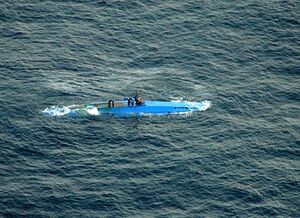Difference between revisions of "Submarine"
(links) |
(picture) |
||
| (3 intermediate revisions by the same user not shown) | |||
| Line 3: | Line 3: | ||
|image=Submarine.jpg | |image=Submarine.jpg | ||
|image_width=400px | |image_width=400px | ||
| − | |constitutes=warship | + | |constitutes=warship, technology, nuclear weapon |
|interests= | |interests= | ||
| + | |start=1864 | ||
}} | }} | ||
| − | A '''submarine''' (or sub) is a naval vessel that is capable of propelling itself beneath the water. A submersible in contrast must stay close to the water surface and can not reach depths of submarines, which can go more than 10.000 meters in case of specialized versions. Submarines were first widely used during World War I | + | A '''submarine''' (or sub) is a naval vessel that is capable of propelling itself beneath the water. A submersible in contrast must stay close to the water surface and can not reach depths of submarines, which can go more than 10.000 meters in case of specialized versions.<ref>https://tritonsubs.com/subs/t36000-2/</ref><ref>https://en.wikipedia.org/wiki/Triton_Submarines</ref> |
| + | |||
| + | Submarines were first widely used during World War I and are now used in many navies. Military uses include: | ||
*attacking enemy surface ships (merchant and military) or other submarines | *attacking enemy surface ships (merchant and military) or other submarines | ||
*attacking [[aircraft carrier]] and their protection | *attacking [[aircraft carrier]] and their protection | ||
*blockade running | *blockade running | ||
| − | *[[ballistic missile]] submarines as part of a nuclear strike force | + | *[[ballistic missile]] submarines as part of a [[nuclear strike force]] |
*reconnaissance | *reconnaissance | ||
*conventional land attack (using cruise missiles) | *conventional land attack (using cruise missiles) | ||
| Line 16: | Line 19: | ||
**tapping of [[Internet]] communication cables | **tapping of [[Internet]] communication cables | ||
| − | Civilian uses include marine science, salvage, exploration | + | ==Submarine tracking== |
| + | Submarines, especially those with [[nuclear warheads]], are constantly tracked and,<ref>https://www.voltairenet.org/article212491.html</ref> depending on the situation, followed by attack submarines that are designed to destroy them quickly in case a war breaks out. The United States has developed a system with microphones in the ocean from the [[1950s]] on to register approaching [[Soviet]] submarines.<ref>https://dosits.org/people-and-sound/history-of-underwater-acoustics/the-cold-war-history-of-the-sound-surveillance-system-sosus/</ref> New methods and systems to track submarine movement underwater are constantly in development.<ref>https://nationalinterest.org/blog/reboot/china-researching-quantum-radars-track-and-kill-submarines-163828</ref> | ||
| + | |||
| + | ==Civilian submarines== | ||
| + | Civilian uses may include marine science, salvage, exploration, facility inspection and maintenance and [[tourism]].<ref>https://www.huffpost.com/entry/these-6-deep-sea-sub-tour_b_5256317</ref><ref>http://www.bbc.com/travel/story/20200628-is-the-future-of-travel-underwater</ref> Submarines can also be modified to perform more specialized functions such as search-and-rescue missions or undersea cable repair. | ||
| − | Submersibles are built and used by [[organised crime]] for [[drug smuggling]] | + | ==Submersibles== |
| + | [[File:Submersibles.jpg|right|300px]] | ||
| + | Submersibles are built and used by [[organised crime]] for [[drug smuggling]]<ref>http://www.hisutton.com/Narco%20Subs%20101.html</ref> and are also used in the [[tourism]] sector. | ||
==False Flag Operations== | ==False Flag Operations== | ||
Latest revision as of 23:29, 9 October 2021
(warship, technology, nuclear weapon) | |
|---|---|
 | |
| Start | 1864 |
| Interest of | National Underwater Reconnaissance Office |
A submarine (or sub) is a naval vessel that is capable of propelling itself beneath the water. A submersible in contrast must stay close to the water surface and can not reach depths of submarines, which can go more than 10.000 meters in case of specialized versions.[1][2]
Submarines were first widely used during World War I and are now used in many navies. Military uses include:
- attacking enemy surface ships (merchant and military) or other submarines
- attacking aircraft carrier and their protection
- blockade running
- ballistic missile submarines as part of a nuclear strike force
- reconnaissance
- conventional land attack (using cruise missiles)
- covert insertion of special forces
- tapping of Internet communication cables
Contents
Submarine tracking
Submarines, especially those with nuclear warheads, are constantly tracked and,[3] depending on the situation, followed by attack submarines that are designed to destroy them quickly in case a war breaks out. The United States has developed a system with microphones in the ocean from the 1950s on to register approaching Soviet submarines.[4] New methods and systems to track submarine movement underwater are constantly in development.[5]
Civilian submarines
Civilian uses may include marine science, salvage, exploration, facility inspection and maintenance and tourism.[6][7] Submarines can also be modified to perform more specialized functions such as search-and-rescue missions or undersea cable repair.
Submersibles
Submersibles are built and used by organised crime for drug smuggling[8] and are also used in the tourism sector.
False Flag Operations
- Full article: The Reagan Method
- Full article: The Reagan Method
In the 1980s Sweden, NATO submarines played a big role in a regime change operation against Olof Palme's Social Democrat government. In secret agreement with Swedish naval staff, but not the Swedish government, the vessels penetrated Swedish waters several hundred times over a period of several years. Unusually for normally stealthy submarines, they made sure they were observed, leading to the Swedish navy performing several search missions to great media attention. The Soviets were blamed, but senior US and British politicians later admitted to the NATO operation.
A by appearance similar incident, a submarine infiltrating Swedish waters, was again reported in 2014.[9] As of 2019 it remains unsolved.
Examples
| Page name | Description |
|---|---|
| German submarine U-234 | A German submarine carrying uranium and high technology. Surrendered to the United States in 1945. |
| HNLMS K XVII | A Dutch submarine, allegedly sunk by UK Naval Intelligence in December 1941 after it stumbled across a fleet of Japanese warships heading for Pearl Harbor. |
| UK/Nuclear weapons | The UK has nuclear weapons on submarines |
| Whiskey on the Rocks | Soviet submarine that ran aground on the south coast of Sweden in 1981 |
Related Quotation
| Page | Quote | Author | Date |
|---|---|---|---|
| AUKUS | “For $360 billion, we're going to get eight submarines. It must be the worst deal in all history” | Paul Keating | 15 March 2023 |
References
- ↑ https://tritonsubs.com/subs/t36000-2/
- ↑ https://en.wikipedia.org/wiki/Triton_Submarines
- ↑ https://www.voltairenet.org/article212491.html
- ↑ https://dosits.org/people-and-sound/history-of-underwater-acoustics/the-cold-war-history-of-the-sound-surveillance-system-sosus/
- ↑ https://nationalinterest.org/blog/reboot/china-researching-quantum-radars-track-and-kill-submarines-163828
- ↑ https://www.huffpost.com/entry/these-6-deep-sea-sub-tour_b_5256317
- ↑ http://www.bbc.com/travel/story/20200628-is-the-future-of-travel-underwater
- ↑ http://www.hisutton.com/Narco%20Subs%20101.html
- ↑ https://www.nzz.ch/international/schwedens-vergebliche-u-boot-jagd-und-was-davon-bleibt-ld.1516130
